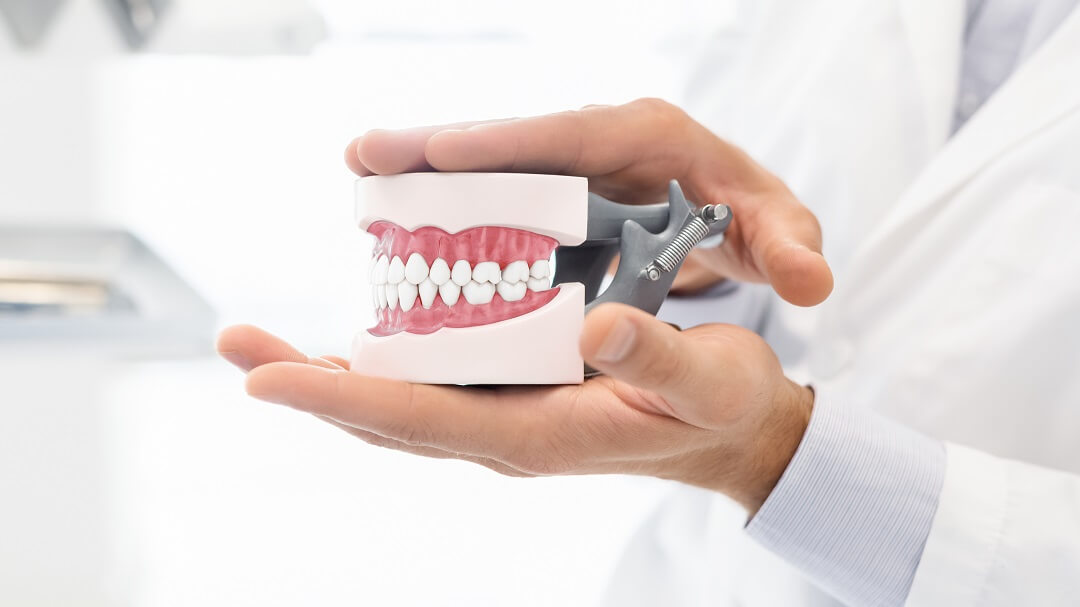TMJ stands for temporomandibular joint. These joints connect your lower jawbone to your skull. You have one on each side of your face, just in front of your ears. Your TMJs assist in jaw movement necessary for speaking and chewing. Unfortunately, as with any joint in the body, TMJ disorders are not uncommon. In fact, the National Institutes of Health estimate that over 10 million Americans may be affected with a TMJ disorder. Given how often you use this joint during a normal day, TMJ disorders can become a serious issue. Knowing who to see and when to seek treatment is essential and your team at Soundview Family Dental is here to answer all your TMJ questions.
Key Takeaways
- TMJ disorders can cause jaw pain, headaches, earaches, and other symptoms.
- TMJ specialists, who are dentists specializing in musculoskeletal disorders, provide comprehensive treatment plans.
- Treatment options for TMJ disorders include mouthguards, custom-made splints, joint injections, and surgical options.
- TMJ specialists work with your general dentist and physician to develop a treatment plan.
- Early treatment of TMJ symptoms is important to prevent further damage to the joints. Preventive measures include avoiding gum chewing and reducing stress.
Signs and symptoms of TMJ disorders
TMJ disorders occur when the ligaments and muscles surrounding the joints become injured, inflamed, or irritated. These disorders are most common in women between the ages of 20 and 40. However, anyone can experience TMJ dysfunction. Common symptoms associated with TMJ disorders include:
- Jaw pain
- Headaches
- Earaches or ringing in the ear
- Pain that spreads into the neck and shoulders
- Inability to open your mouth completely
- Clicking, popping, or grinding sounds when moving your jaw
- General fatigue in the facial muscles
- Changes in your bite or the way your teeth come together
- Tooth pain
- Pain when chewing or difficulty chewing
- Inability to open or close the jaw as the joint “locks” in place
What causes TMJ disorders?
Because TMJ affects a joint and the related symptoms are not tooth-related, many people seek treatment from their primary care physician. However, your best choice for TMJ treatment is a dentist that specializes in musculoskeletal disorders. These dentists do more than simply treat problems with your teeth. They are trained in the anatomy of the jaw and diagnosing bite dysfunction.
In addition to dentists, TMJ patients can also benefit from seeing other providers depending on the cause of their TMJ disorder. If stress is contributing to TMJ dysfunction, counseling to reduce stress may be beneficial. Physical therapists can also help to stretch and strengthen the jaw muscles to help reduce symptoms.
What does a TMJ specialist do?
A TMJ specialist will work closely with your physician and general dentist to develop a comprehensive treatment plan that addresses your specific TMJ causes. Initially, treatment focuses on managing pain and alleviating any symptoms. Simple treatments can include applying ice or heat to the jaw, as well as anti-inflammatory medications. A few days of a soft food diet can also give the muscles time to relax and heal, helping to reduce muscle strain and jaw dysfunction.
Specific treatments will vary depending on the underlying cause of your TMJ disorder. Treatments will start conservatively but will progress to more invasive treatment options if necessary. Below are some possible TMJ treatment options your specialist may try to reduce your symptoms and help control any TMJ flare-ups.
1. Mouthguards
Because bruxism is often an underlying cause of TMJ disorders, mouthguards are often a first-line treatment option. These mouthguards, worn during the day or while you sleep, help keep the jaw aligned and reduce stress on your jaw from teeth clenching and grinding. Depending on your level of grinding and clenching, you may have a soft night guard, hard night guard, or hybrid guard.
2. Custom-made splints
In addition to mouthguards for bruxism, other custom-made splints treat specific TMJ causes. These splints work to promote jaw muscle relaxation, evenly distribute pressure across your teeth, reposition your jaw alignment, or reduce strain on the joint directly. Some common splint options include:
- Stabilization Splints
- Repositioning Splints
- NTI-tss Devices
3. Joint injections
Like knee injections given to athletes to reduce swelling and pain, your specialist can inject cortisone or BOTOX into the temporomandibular joints. These injections can bring down the swelling in the jaw, allowing you to speak and eat pain-free.
4. Surgical options
When more conservative treatment options fail, surgical options may be necessary. These treatments are reserved for the most severe cases. They can include:
- Arthrocentesis – TMJ specialists insert small needles into the joint to drain fluid that can contribute to pain and decreased joint mobility.
- Arthroscopic surgery – Small instruments connected to the camera work to treat problems with the TMJ. These can include thickened cartilage removal, scar tissue removal, reposition the disc, reshape the jawbone, flush the joint, and inserting anti-inflammatory medicine directly into the joint.
- Open-joint arthroplasty – This open surgery exposes the entire joint and allows the surgeon to repair, reposition, or replace the joint disc.
When should you see a TMJ specialist?
If you are experiencing any of the mentioned symptoms, talk to your general dentist about seeing a TMJ specialist. Early treatment will help to reduce your pain and improve its function. Ignoring TMJ symptoms can lead to increased damage to the joints and the need for more invasive treatment options.
Preventing TMJ disorders
The good news is that you can do some things to reduce your risk of developing TMJ or at least reduce the pain associated with TMJ. These can include:
- Stop chewing gum – Daily gum chewing may keep your breath fresh, but it can overstress the jaw muscles and TMJs. This stress can then contribute to regular headaches or migraines.
- Treat potential causes – If you know you grind your teeth or the alignment of your teeth is off, talk with your dentist about possible treatment options.
- Reduce stress – Increased stress contributes to jaw clenching and teeth grinding, which can aggravate your temporomandibular joints.
You don’t need to live with TMJ pain
If you are experiencing regular jaw pain, now is the time to address that pain! At Soundview Family Dental, we understand how painful TMJ disorders can be, and we want to help. Our team will work with you to diagnosis any potential underlying conditions and create an individualized treatment plan that will help restore healthy joints and a pain-free smile. Contact us online today or call our office at (425) 563-6360 to schedule a consultation.


